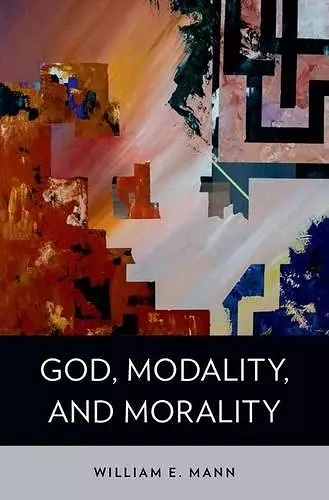God, Modality, and Morality
Format:Hardback
Publisher:Oxford University Press Inc
Published:25th Jun '15
Currently unavailable, and unfortunately no date known when it will be back

Suppose that God exists: what difference would that make to the world? The answer depends on the nature of God and the nature of the world. In this book, William E. Mann argues in one new and sixteen previously published essays for a modern interpretation of a traditional conception of God as a simple, necessarily existing, personal being. Divine simplicity entails that God has no physical composition or temporal stages; that there is in God no distinction between essence and existence; that there is no partitioning of God's mental life into beliefs, desires, and intentions. God is thus a spiritual, eternal being, dependent on nothing else, whose essence is to exist and whose mode of existence is identical with omniscience, omnipotence, and perfectly goodness. In metaphysical contrast, the world is a spatial matrix populated most conspicuously by finite physical objects whose careers proceed sequentially from past to present to future. Mann defends a view according to which the world was created out of nothing and is sustained in existence from moment to moment by God. The differences in metaphysical status between creator and creatures raise questions for which Mann suggests answers. How can God know contingent facts and necessary truths without depending on them? Why is it so easy to overlook God's presence? Why would self-sufficient God create anything? Wouldn't a perfect God create the best world possible? Can God be free? Can we be free if God's power is continuously necessary to sustain us in existence? If God does sustain us, is God an accomplice whenever we sin? Mann responds to the Euthyphro dilemma by arguing for a kind of divine command metaethical theory, whose normative content lays emphasis on love. Given the metaphysical differences between us, how can there be loving relationships between God and creatures? Mann responds by examining the notions of piety and hope.
This is a book philosophers of religion will want on their shelvesThese influential papers combine analytic precision with historical erudition: in many places Mann works directly from the classical texts and supplies his own translations. Mann ranges masterfully over a wealth of topics from the highly abstract (divine simplicity, aseity, sovereignty, immutability, omnipresence) to the deeply existential (mysticism, divine love, human love and lust, guilt, lying, piety, hope). * William Vallicella, Faith and Philosophy *
These essays all raise very interesting issues in philosophical theology. It is fascinating to observe the role Mann assigns to divine simplicity in resolving so many of them. Anyone working in metaphysics and philosophical theology will certainly benefit from the painstaking attention Mann affords to simplicity and its surrounding issues. * Michael J. Almeida, Notre Dame Philosophical Reviews Online *
ISBN: 9780199370764
Dimensions: 155mm x 236mm x 41mm
Weight: 590g
380 pages